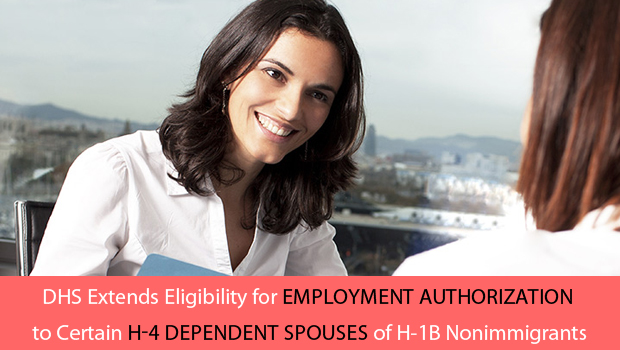By Coleman Jackson, Attorney, CPA
February 25, 2015
U.S. Citizenship and Immigration Services (USCIS) announced that the Department of Homeland Security (DHS) is extending eligibility for employment authorization to certain H-4 dependent spouses of H-1B nonimmigrants who are seeking employment-based lawful permanent resident (LPR) status, effective May 26, 2015. DHS amended the regulations to allow these H-4 dependent spouses to accept employment in the United States.
Who is eligible?
Eligible individuals include certain H-4 dependent spouses of H-1B nonimmigrants who:
- Are the principal beneficiaries of an approved Form I-140, Immigrant Petition for Alien Worker; or
- Have been granted H-1B status under sections 106(a) and (b) of the American Competitiveness in the Twenty-first Century Act of 2000 as amended by the 21st Century Department of Justice Appropriations Authorization Act. The Act permits H-1B nonimmigrants seeking lawful permanent residence to work and remain in the United States beyond the six-year limit on their H-1B status.
How to apply?
Eligible H-4 dependent spouses must file Form I-765, Application for Employment Authorization, with supporting evidence and the required $380 fee in order to obtain employment authorization and receive a Form I-766, Employment Authorization Document (EAD). USCIS will begin accepting applications on May 26, 2015. Once USCIS approves the Form I-765 and the H-4 dependent spouse receives an EAD, he or she may begin working in the United States.
This is one of several initiatives underway to modernize, improve and clarify visa programs to grow the U.S. economy and create jobs. It will help U.S. businesses keep their highly skilled workers by increasing the chances these workers will choose to stay in this country during the transition from temporary workers to permanent residents. It also provides more economic stability and better quality of life for the affected families.
This blog is written by the Tax & Immigration Law Firm of Coleman Jackson, P.C. for educational purposes; it does not create an attorney-client relationship between this law firm and its reader. You should consult with legal counsel with respect to your particular set of circumstances.
Coleman Jackson, P.C. | Immigration & Tax Law Firm | www.cjacksonlaw.com | (214) 599-0431


